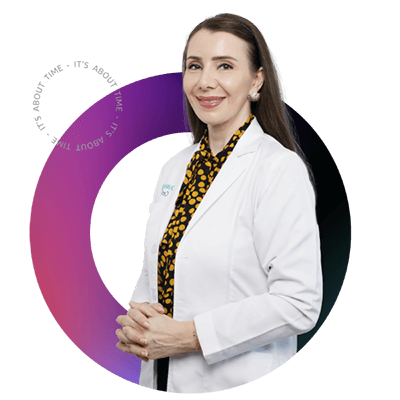Mohs micrographic surgery is a sophisticated skin cancer treatment approach that combines surgery and microscopic margin inspection.
Mohs surgery is the most efficient skin cancer treatment available today; It offers the highest chance of curing the majority of skin malignancies (up to a 99% success rate), even if cancer has already been treated with another approach. This is because this procedure works on removing cancer tumors with extreme precision while preserving healthy skin and tissue.
The procedure involves removing a disc or “layer” of tissue, which is then digested into microscope slides in the Mohs laboratory in real-time for examination. These slides are thoroughly examined to identify any remaining tumors, and the surgeon will repeat this process until no tumors are found. The benefits of this method include the highest cure rates for most skin malignancies and the least amount of healthy tissue damage.
When is Mohs Surgery recommended?
Mohs surgery enjoys one of the highest cure rates of any skin cancer treatment and can be utilized for almost every type of skin cancer. Other appropriate skin cancer treatments include freezing (cryosurgery), scraping and burning, surgical removal (excision), and laser surgery, all of which necessitate the surgeon to estimate how extensively to treat the area around the tumor. Mohs surgery has several advantages over other skin cancer therapies, including a high cure rate and cost-effectiveness.
It is particularly beneficial for skin malignancies in areas that affects a person’s appearance, like the head, face, neck, hands, feet, and genitalia. It is also suitable for skin cancers that have previously been treated and returned.
What are the advantages of Mohs Surgery?
Mohs surgery is highly effective because the extracted tissue is inspected microscopically, with 100 percent of the surgical margins being evaluated. Among the advantages of Mohs surgery are:
- One-day outpatient procedure.
- Curing skin cancer after previous treatments have failed.
- Ensuring the total elimination of cancer during surgery.
- Reducing the possibility of re-developing skin cancer.
- Limiting the amount of lost healthy tissue.
How to Prepare for Surgery?
We strongly advise you to ask a friend or a family member to drive you to and from your appointment. You’ll get wound care instructions from the nurses following your operation; if the surgical site requires that a third party perform wound care, the nurses can go over it with you and answer any questions you have.
Moreover, patients don’t have to stop taking any prescribed or recommended medications, including blood thinners. You can bring all of your prescriptions to the hospital on the day of your surgery so that the nurses help you take them.
We also advise patients to eat their regular breakfast meal before surgery, and they can also consume a snack or lunch during the day if their surgery involves multiple phases.
How long does the surgery take?
The size of the tumor determines how long the procedure will take. Surgery can take anywhere from a few hours to a half-day. Tissue processing takes a lot of time; therefore, you can bring some reading material or a mobile device that you can use to pass the time.
Post-Operative Care
Immediately following your Mohs surgery, a member of our medical staff will walk you through wound care steps. In case of an emergency, your doctor will provide you with clear instructions and contact details for your Mohs surgeon.
We recommend avoiding vigorous activities for at least a week after surgery to maintain the surgical wound. If the skin cancer is located in the middle area of your face, you should be prepared for swelling, redness, and bruising to be noticeable for one- or two weeks following surgery, particularly in the forehead, eyes, nose, or lips.
Most patients visit the clinic one to two weeks after surgery to get their stitches taken out and check on the wound’s progress. You may need to return for future appointments to confirm that the scar has healed properly. You must visit your referring doctor or primary care provider frequently for skin examinations to check for any new skin malignancies.
We recommend that patients avoid the sun between 10 am and 4 pm and not use tanning salons to protect themselves from damaging UV radiation. Our experts also advise wearing a hat with a wide brim, long sleeves, and slacks whenever exposed to the sunlight. Moreover, use sunscreens with a sun protection factor (SPF) of 30 or higher on exposed skin daily.
Book your appointment at Novomed today!
To book an appointment with one of our expert dermatologists in Dubai or if you have any inquiries about the diagnosis and treatment of skin cancer, call us toll-free on 8006686 or click the live chat icon at the bottom of the screen.



























